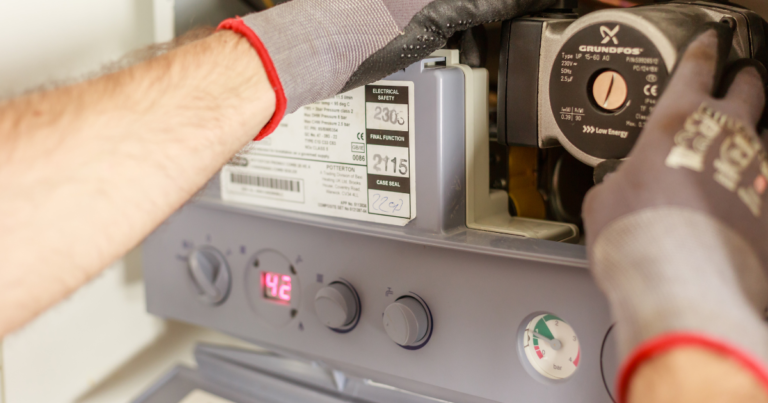Is your boiler losing pressure faster than you can say “cold shower”?
Boiler pressure problems can be a real pain in the backside, especially when you’re left shivering on a cold morning in Spalding. Maintaining the right boiler pressure is crucial for a well-functioning heating system.
But don’t worry, we’re here to help you understand why your boiler might be acting up and what you can do about it.
Let’s get started with the basics…
Boiler pressure is the force of the water in your heating system, measured in bars. It’s essential for keeping your home toasty and your taps flowing.
Ideally, you’re looking for a sweet spot between 1 and 1.5 bars when your system is cold. As things heat up, you can expect a slight bump in pressure.
Why does it matter? Well, low pressure means lukewarm radiators and no hot water. Too high, and there’s a risk of leaks or boiler damage.
Regularly checking and tweaking your boiler pressure keeps everything running smoothly, saving you cash on energy bills and avoiding hefty repair costs.

Low pressure can make your boiler inefficient or cause it to shut down. Signs include lukewarm radiators, inconsistent heating, or the boiler failing to ignite.
Check your boiler’s manual for instructions on how to repressurise it safely. If you’re unsure or uncomfortable doing this, call in a qualified heating engineer. Better safe than sorry!
Low boiler pressure can be caused by a few different issues. Here’s a few of the common suspects:
Leaks are a major cause of pressure loss. Even a small drip can lead to significant drops in pressure over time. Check for damp patches, water stains, or puddles around your boiler, radiators, and pipes.
A bit of duct tape won’t fix this issue. So, if you do notice something, don’t just leave it to keep dripping hoping it will magically disappear (it won’t). Instead, give a Gas Safe Engineer a call to come out and inspect it.
Bleeding your radiators to remove trapped air is necessary, but it also releases water from the system. If you don’t top up the water afterwards, it can result in low pressure.
To fix low boiler pressure after bleeding radiators, you need to re-pressurise the system. Here’s how you do it:
And voilà, you’re done! If you’re still having trouble, it’s always a good idea to call in a pro.
This valve is supposed to release excess pressure. If it’s not working properly, it might be letting out water unnecessarily, causing a drop in pressure.
There is really nothing you can do in this situation other than to contact a professional to change the valve and check if the copper pipe above is leaking.
If you need some help we provide expert boiler repair services in Spalding performed by Gas Safe registered engineers. Get in touch with us today to solve your boiler problems.
The expansion vessel absorbs extra pressure when the water heats up. If it’s faulty or needs recharging, it can lead to pressure problems.
Getting your boiler serviced annually will help prevent problems, like damaged expansion vessels, from happening in the first place. Don’t worry, though – repairing a damaged expansion vessel is neither difficult nor expensive, but it is always recommended to hire a licensed professional.

Boilers losing pressure is a common issue, but it’s often easy to fix.
Here’s a simple guide to help you boost your boiler pressure:
Always refer to your boiler’s manual if you’re unsure, as instructions can vary.
If you’ve tried the DIY fixes and your boiler is still losing pressure, it’s time to call in the experts.
At George Kitchen Plumbing & Heating, we’ve got your back. Serving Spalding and the Lincolnshire area, our Gas Safe registered engineers are ready to help with all your boiler needs.
Get in touch today to get your heating system back on track!
If your boiler pressure keeps dropping, it could be due to a few issues: leaks in the system, faulty pressure valves, or air escaping from radiators. Sometimes, you might not be able to find the fault, which can be frustrating, especially if you’re left with no heating or hot water.
Low boiler pressure isn’t physically dangerous to you, but it can harm your heating system. It can reduce boiler efficiency, make it louder, and impact hot water availability. Long-term low pressure can cause more damage to your boiler and heating system, and increase your energy bills. It’s advisable to get a Gas Safe engineer to fix it.
When the heating is off, your boiler pressure should ideally be between 1 to 1.5 bars.